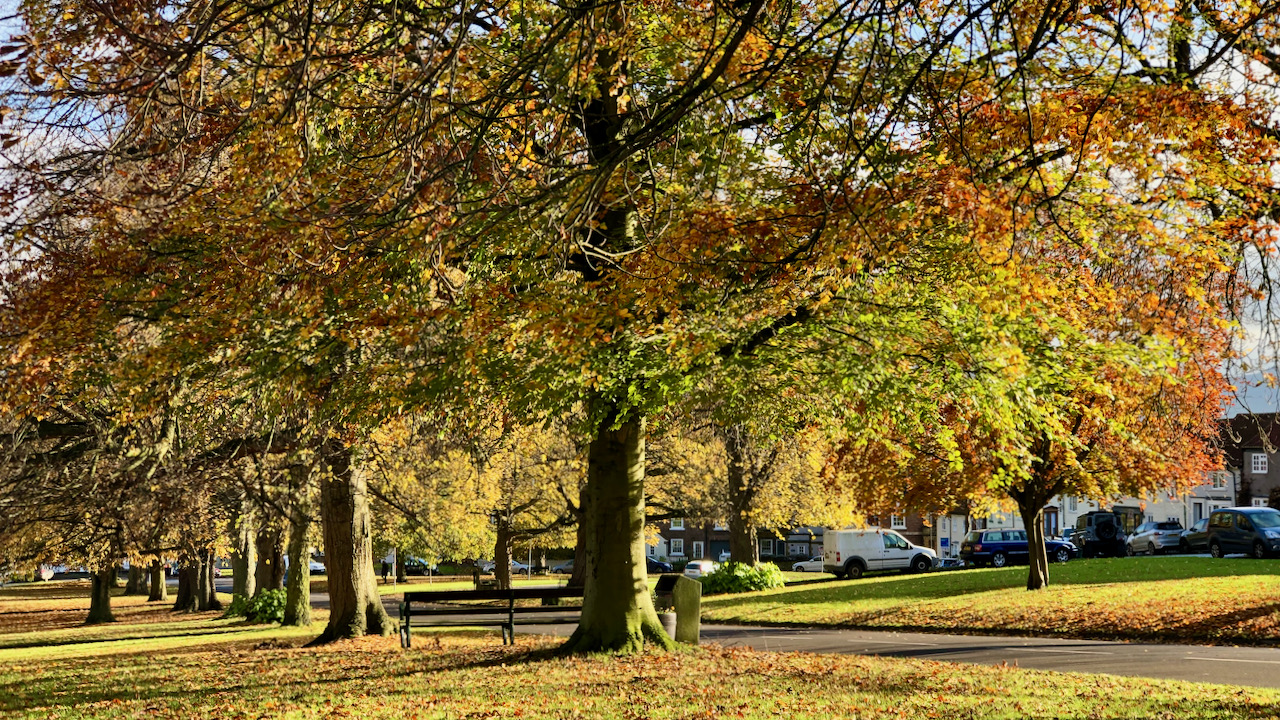Hutton Rudby must be one of the prettiest villages in Cleveland, particularly when adorned in the splendid hues of autumn. However, beneath this picturesque facade lurks a shadowy past.
Despite the outright ban on cockfighting in England with the Cruelty to Animals Act of 1835, the so-called ‘sport’ persisted well beyond the legal decree against such contests1‘Cockfight’, Wikipedia (Wikimedia Foundation) <https://en.wikipedia.org/wiki/Cockfight#:~:text=Cockfighting%20was%20banned%20outright%20in%20England%20and%20Wales%20and%20in%20the%20British%20Overseas%20Territories%20with%20the%20Cruelty%20to%20Animals%20Act%201835.> [accessed 10 November 2023].
Richard Blakeborough recounts a tale of cockfighting in Hutton Rudby in the mid-19th century2Blakeborough, R. ‘Sports and Pastimes 100 Years Ago.’ | Northern Weekly Gazette | Saturday 25 April 1903 | British Newspaper Archive’. 2022. Britishnewspaperarchive.co.uk <https://www.britishnewspaperarchive.co.uk/viewer/bl/0003075/19030425/063/0009> [accessed 27 November 2022]. It’s a story which could be repeated in every village. The protagonist of this unsavoury episode is one Robert Dorking, a weaver by trade.
Many a fierce contest or ‘main‘ took place in or around the village, particularly on a peaceful Sunday morning. This man Dorking raised birds which were renowned far and wide. They were pitted against some of the finest birds in the North, and the battleground shifted to Newcastle on numerous occasions.
Despite the considerable distance, Dorking, fuelled by his enthusiasm, traversed the miles on foot. Such journeys were not uncommon in those days, where walking for twenty or thirty miles was deemed unremarkable. Imagine the scenes as Dorking, resting at a wayside inn for the night, proudly exhibited his prized bird. Conversations naturally revolved around the tales of past battles, with alehouse patrons critically analysing the serious attributes of the avian gladiator.
The bird, a spectacle on the sanded floor, would strut with unconquered pride, each feather meticulously preened and gleaming. The journey back, however, painted a different picture. Perhaps birdless and defeated, Dorking retraced his steps, the once-confident enthusiast now dispirited. His avian companion, once a symbol of glory, lay conquered.
Picture the sombre return journey, as Dorking, crestfallen and lacking the courage to face those who witnessed his earlier boasting, sought an alternative route home. The perceptive villagers of Hutton Rudby could always discern Dorking’s fate. Long before he emerged from his bed after the arduous tramp, news of his victory or defeat in Newcastle had already circulated among the close-knit community.
When Dorking’s gamecocks faced defeat, a sight that occurred more often than he’d care to admit, he’d lug around as many as four birds on his back, each in its own hamper. His wife, appearing rather subdued, would emerge with her head concealed in a shawl, uttering not a single word to anyone. She’d skulk along, head bowed, as cantankerous as a bear nursing a sore head. However, when Dorking returned triumphant, she’d transform, donning her finest hood and traversing the village with infectious zeal to broadcast the glad tidings. Nothing could restrain her in those moments.
This anecdote sheds a glimmer on the events of that era, where enthusiasts of cockfighting engaged in friendly clashes on Sunday mornings. On one occasion, a clergyman with a penchant for sport stumbled upon the gathering. It was a “fair catch,” leaving those present undoubtedly feeling a tinge of shame. The clergyman, in eloquent terms, rebuked them for squandering the Sabbath, decrying the encouragement of cockfighting. Dorking retorted that the birds would fight without any encouragement, insisting, “Set two together, and they’ll fight for certain.” The pastor, cognisant of the undeniable truth in the statement, observed the ensuing fierce battle with an eagerness unmatched by any. Afterwards, the pastor conceded, acknowledging the accuracy of Dorking’s words. A sly member of the assembly cheekily remarked that the parson derived immense pleasure from being convinced.
For almost two hundred years, cockfighting has been illegal, yet other practices of deriving entertainment from the killing and suffering of birds and animals still persist, both legally and underground. They are not only ethically reprehensible but also raise fundamental questions about our humanity. I tell this tale not to glorify cockfighting but as a snippet of history and hope that our leisure pursuits reflect the values of compassion and respect for life.
will foster an environment where empathy prevails over brutality,
- 1‘Cockfight’, Wikipedia (Wikimedia Foundation) <https://en.wikipedia.org/wiki/Cockfight#:~:text=Cockfighting%20was%20banned%20outright%20in%20England%20and%20Wales%20and%20in%20the%20British%20Overseas%20Territories%20with%20the%20Cruelty%20to%20Animals%20Act%201835.> [accessed 10 November 2023]
- 2Blakeborough, R. ‘Sports and Pastimes 100 Years Ago.’ | Northern Weekly Gazette | Saturday 25 April 1903 | British Newspaper Archive’. 2022. Britishnewspaperarchive.co.uk <https://www.britishnewspaperarchive.co.uk/viewer/bl/0003075/19030425/063/0009> [accessed 27 November 2022]

Leave a Reply